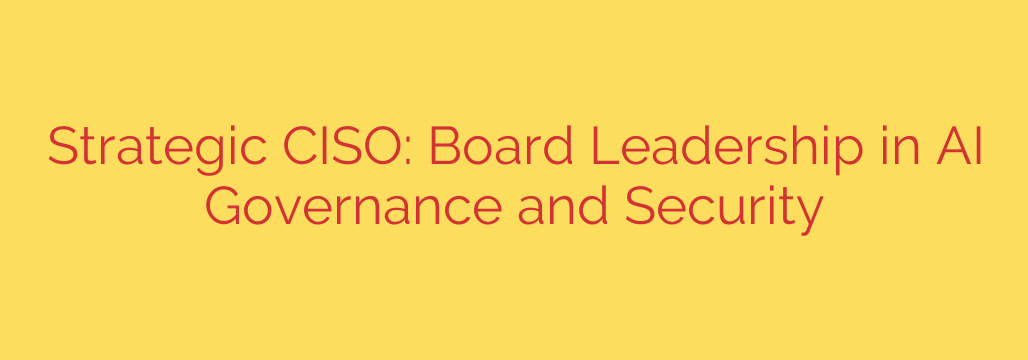
In today’s rapidly evolving technological landscape, the integration of Artificial Intelligence (AI) is becoming fundamental to business operations and strategy. This rapid adoption brings significant opportunities but also introduces complex challenges, particularly regarding governance and security. The Chief Information Security Officer (CISO) plays a critical role in navigating these complexities and must step into a position of strategic leadership to guide their organizations effectively.
Effective AI governance is not just an IT or security concern; it requires board leadership and oversight. Boards need to understand the potential benefits, as well as the profound risks associated with AI deployments, including security vulnerabilities, data privacy issues, ethical considerations, and regulatory compliance. The CISO is uniquely positioned to bridge the gap between the technical nuances of AI risks and the strategic imperatives of the board.
A key responsibility for the CISO is to translate technical jargon into clear, business-relevant insights for the board. This includes articulating the potential impact of AI failures or breaches on business continuity, reputation, and financial stability. Establishing a robust framework for risk management specific to AI is paramount. This involves identifying potential threats, assessing their likelihood and impact, and implementing appropriate controls.
Developing clear policy and guidelines for AI use within the organization is another critical area where the CISO provides essential leadership. This includes defining acceptable use, data handling standards for AI training and operation, model explainability requirements, and incident response plans tailored for AI systems. Collaboration across legal, compliance, data science, and business units is essential to ensure these policies are comprehensive and enforceable.
Furthermore, the CISO must ensure that security is embedded throughout the entire AI lifecycle, from development and training data acquisition to deployment and monitoring. This requires implementing strong security controls around AI infrastructure, protecting training data integrity, securing AI models from adversarial attacks, and continuously monitoring AI systems for anomalous behavior.
By proactively addressing AI governance and security at the board level, organizations can build trust with customers, partners, and regulators. The CISO’s ability to communicate strategically, champion necessary controls, and integrate security considerations into AI initiatives is vital for harnessing the power of AI safely and responsibly, ultimately ensuring the long-term resilience and success of the enterprise.
Source: https://www.helpnetsecurity.com/2025/06/02/aaron-mccray-cdw-cisos-ai-security/








